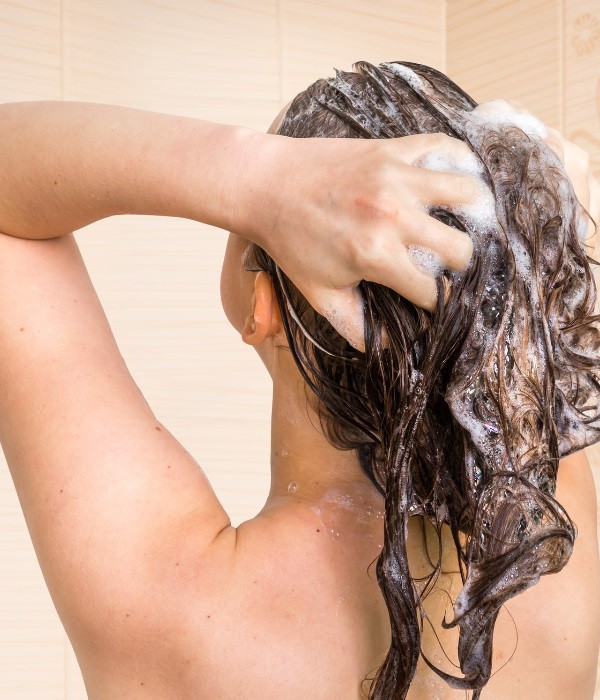This post contains affiliate links.
Updated on April 13, 2025
The native shampoo is good for your hair as it contains natural ingredients that nourish your scalp and hair. The native shampoo is derived from natural ingredients such as herbs, fruits, and plants.
This means that it does not contain harsh chemicals that can harm your hair and scalp in the long run. Instead, it gives a gentle cleanse and nourishes your hair, keeping it healthy and strong. It is free from parabens, sulfates, and silicones that strip your hair of its natural oils.
The natural ingredients in native shampoo promote hair growth, reduce dandruff, and improve the overall health of your hair. If you’re looking for a chemical-free shampoo that is good for your hair and the environment, switch to native shampoo today!
Contents
Native Shampoo: A Look At Its Composition

Related: Does Native Shampoo Cause Hair Loss?
What Is Native Shampoo, And How Is It Different?
Native shampoo is a type of hair care product that is made with natural and organic ingredients. Unlike regular shampoos, which often contain harmful chemicals that can harm your hair, native shampoos are formulated to cleanse your hair gently while protecting it from damage.
Here are some differences between native shampoo and regular shampoo:
- Native shampoo contains natural ingredients such as aloe vera, argan oil, and coconut oil, while regular shampoos often contain harsh chemicals like sulfates and parabens.
- Native shampoo is free of synthetic fragrances, which can irritate the scalp, while regular shampoos often contain these chemicals to add a pleasant scent.
- Native shampoo is generally better for the environment since it is made with sustainably sourced ingredients.
The Native Shampoo Industry
The native shampoo industry has grown significantly in recent years, fueled by consumers’ desire for natural and organic hair care products. Here are some key players in the native shampoo industry and their place in the marketplace:
- Native: This brand is known for its natural and aluminum-free deodorant, but it has recently expanded into hair care products, including shampoo and conditioner.
- Maple Holistics: This brand offers a wide range of natural hair care products, including several different types of native shampoo.
- Shea Moisture: This brand is known for its natural and organic hair care products, including several different types of native shampoo.
The Science Behind Native Shampoo
Native shampoo contains several natural ingredients that are beneficial for your hair and scalp. Here are some of the key ingredients in native shampoo and how they work:
- Aloe vera: This ingredient is hydrating and soothing to the scalp, reducing irritation and dandruff. It can also help to strengthen hair.
- Argan oil: This oil contains antioxidants and vitamins that can help to improve hair health and reduce frizz.
- Coconut oil: This ingredient is hydrating and helps to prevent breakage and split ends.
Can Native Shampoo Help Improve Hair Growth?
While there is no direct evidence that native shampoo can improve hair growth, it contains several ingredients that can promote hair health and prevent damage. By using native shampoo, you can enjoy stronger, healthier hair that is less prone to breakage and damage, which can ultimately lead to longer hair.
The Benefits Of Using Native Shampoo

Native shampoo is a popular choice among people who want to use natural hair care products. Here are some pros and cons of using native shampoo:
Pros:
- Native shampoo typically contains fewer chemicals than regular shampoo.
- It can help to promote healthy hair growth and prevent hair loss.
- It is suitable for people with sensitive skin or allergies.
- Native shampoos are cruelty-free and often vegan-friendly.
Cons:
- Native shampoos can be more expensive than regular shampoos.
- They may not lather as much as regular shampoos.
- It may take time for your hair to adjust to a new shampoo, so you may experience some changes in texture or oiliness at first.
- Some native shampoos may not work as well on certain hair types.
Native Shampoo Vs. Other Hair-Care Products
While native shampoo may seem similar to other natural hair care products, such as organic or sulfate-free shampoos, it has some unique properties. Here’s how it stands out:
- Native shampoo is made with plant-based ingredients sourced from specific regions, making it unique to those areas.
- It is free from chemical additives, synthetic fragrances, and preservatives.
- Native shampoos do not strip the scalp’s natural oils, which can help to protect and nourish the hair.
Does Native Shampoo Provide Enhanced Moisturizing And Nourishing?
Yes! Native shampoo contains natural ingredients that can help to moisturize and nourish the hair. Here are some examples:
- Coconut oil and aloe vera can help to hydrate the hair and prevent dryness and breakage.
- Jojoba oil can help to regulate the scalp’s oil production, which can prevent excessive oiliness or dryness.
- Essential oils like rosemary and lavender can promote hair growth and soothe an itchy scalp.
Native Shampoo Use For Dry, Oily, And Brittle Hair
Native shampoo can be used for all hair types, but it’s important to choose the right formulation for your hair concerns. Here’s a guide:
- Dry hair: Look for a native shampoo with hydrating ingredients like coconut oil, aloe vera, or shea butter.
- Oily hair: Look for a native shampoo with ingredients like tea tree oil or peppermint oil, which can help to regulate oil production and prevent buildup.
- Brittle hair: Look for a native shampoo with nourishing ingredients like jojoba oil, argan oil, or avocado oil, which can help to strengthen and repair damaged hair.
Related: Can I Use Setting Powder And Setting Spray Together?
How Does Native Shampoo Work On Different Hair Types?
When it comes to hair care, there are a plethora of products available in the market. Native shampoo is one such product that has gained immense popularity in recent times. It is a natural hair care product that is designed to nourish and strengthen hair, without the use of harsh chemicals.
Before using any product, it’s essential to know whether it’s suitable for your specific hair type or not. We will discuss native shampoo and its effectiveness on different hair types.
What Works For Natural And Chemically Treated Hair?
- Native shampoo is an excellent choice for those who want to move away from using chemical-based hair products and prefer a more natural approach.
- Natural hair tends to be less damaged, but it still needs essential nutrients to maintain its health and shine. Native shampoo can help meet such requirements as it contains natural ingredients like aloe vera and chamomile, well-known for their nourishing properties.
- Chemically treated hair requires extra care as the chemicals can weaken the hair and cause it to break. Native shampoo is formulated with natural ingredients that can help restore damaged hair and make it stronger.
Can Native Shampoo Help Reduce Hair Loss And Promote Healthy Hair Growth?
- Native shampoo can be helpful in reducing hair loss and promoting healthy hair growth due to its natural ingredients like argan oil and biotin.
- Argan oil is famous for its hair care benefits. It is rich in vitamins, minerals, and antioxidants, which are essential for healthy hair growth.
- Biotin is a vital ingredient for hair growth and health. It is well-known for strengthening hair and preventing hair loss.
Is Native Shampoo Good For People With Scalp?
- Native shampoo is designed to be gentle and nourishing, making it an excellent choice for people with scalp conditions like dandruff or eczema.
- The natural ingredients used in native shampoos, like tea tree oil and lavender oil, are known for their antifungal and antimicrobial properties, making them an effective solution for treating scalp conditions.
- Unlike chemical-based shampoos, native shampoo is free from sulfates and other harsh ingredients that can irritate the scalp and cause further damage.
Why Is Ph Balance An Essential Factor?
- Ph balance is a crucial factor in determining whether a native shampoo is suitable for your hair type or not. The ph balance of native shampoo is neutral, meaning it is neither too acidic nor too alkaline.
- Our scalp has a natural ph level, and when we use shampoos that are too acidic or too alkaline, it can cause hair damage, dandruff, or dryness. Native shampoo’s neutral ph level helps maintain a healthy scalp, eliminating these issues.
- Native shampoo’s ph-balanced formula helps to keep the hair healthy, and nourished and promotes healthy hair growth. It is an excellent choice for those who want to maintain healthy hair naturally.
Native shampoo is a natural hair care product with a range of benefits. It can help nourish and strengthen hair, reduce hair loss, and promote healthy hair growth. It is gentle and suitable for all hair types, including those with scalp conditions like dandruff or eczema.
The ph-balanced formula used in native shampoo makes it ideal for maintaining a healthy scalp and hair, without the use of harsh chemicals. Give it a try, and you might see the difference it makes in your hair’s health and appearance.
Common Myths About Native Shampoo

When it comes to hair care, there is always a debate about using commercial brands versus natural products. One such natural product that has been in the limelight is native shampoo. Native shampoo is said to be free from harsh chemicals and consists of only natural ingredients.
There are numerous myths surrounding native shampoo that may leave you confused. We will be debunking these myths and also examining scientific evidence to help you make an informed decision.
Can Native Shampoo Weaken Hair Follicles?
One of the most common myths surrounding native shampoo is that it can lead to weakened hair follicles and hair loss. This is far from the truth. Native shampoo contains natural ingredients that can nourish hair, and in fact, help improve hair growth.
The real culprits of hair loss are harsh chemicals and artificial fragrances that are often found in commercial brands.
- Native shampoo does not contain harsh chemicals that can cause hair loss.
- Natural ingredients found in native shampoo can actually improve hair growth.
Do Claims Of Being ‘All-Natural’ Mean That Native Shampoo Is Safe For Hair?
Just because a product claims to be ‘all-natural’ does not necessarily mean that it is safe for hair. In the case of native shampoo, the claim holds true. Native shampoo is made from only natural ingredients, which means that it is free from harsh chemicals that are often found in commercial brands.
This makes it safe for regular use, as it does not cause any damage to your hair.
- Native shampoo is safe for hair as it is made from only natural ingredients.
- The absence of harsh chemicals makes it safe for regular use.
Can Overusing Native Shampoo Lead To Build-Up And Clogged Pores?
Another myth surrounding native shampoo is that overusing it can lead to build-up and clogged pores. This is not entirely true. While overusing any shampoo can lead to build-up, this can easily be solved by reducing the frequency of use or by opting for a clarifying shampoo.
Native shampoo does not clog pores as it is made from natural ingredients that are gentle on the scalp.
- Overusing any product can lead to build-up.
- Native shampoo does not clog pores as it is made from natural and gentle ingredients.
The Scientific Evidence Supporting Native Shampoo’s Safety And Benefits
Numerous studies have been conducted that prove the safety and benefits of using natural ingredients on hair. These studies have shown that natural ingredients do not cause any damage to the hair or scalp, and can in fact, help improve hair growth and create stronger, shinier hair.
- Studies have shown that natural ingredients are safe for hair and scalp.
- Natural ingredients can help improve hair growth and create stronger, shinier hair.
How To Choose The Right Native Shampoo For Your Hair?
Choosing the right native shampoo for your hair can be tricky, but with the following tips and tricks, you can find the perfect shampoo for your hair needs:
- Determine your hair type: Different hair types require different nutrients and care. Determine whether your hair is oily, dry, or in-between to help narrow down the best native shampoo for your hair.
- Check the ingredients list: Look out for natural ingredients like aloe vera, coconut oil, and tea tree that provide nourishment to your hair. Stay away from harsh chemicals like sulfates and parabens that can be damaging in the long run.
- Consider your scalp condition: If you have a dry or sensitive scalp, consider a shampoo that contains ingredients like lavender or chamomile to soothe it. For oily scalps, try shampoos that contain tea tree oil or lemon to help balance excess oil.
- Look for cruelty-free and sustainable options: Do your part by choosing native shampoos that are cruelty-free and come in eco-friendly packaging.
Understanding The Ingredients
When choosing a native shampoo, it’s important to take a closer look at the ingredients list. Here are a few ingredients to look for and avoid:
- Look for natural ingredients like aloe vera, argan, or jojoba oil that can nourish your hair without any side effects.
- Avoid harsh chemicals like sulfates and parabens that can strip your hair of its natural oils and cause long-term damage.
- Watch out for fragrances and colorants that can be irritating to your scalp and cause inflammation.
The Role Of Ph Balance
The ph balance of your shampoo plays an important role in maintaining the health of your hair and scalp. A good native shampoo should have a ph level between 4. 5 and 5. 5. This helps maintain the natural ph balance of your hair while also protecting it from environmental stressors.
Using an alkaline shampoo can be damaging to your hair and scalp, so it’s important to choose a native shampoo that maintains the right ph balance.
Choosing Between Different Types Of Native Shampoos
Native shampoos come in different forms, each with its own advantages and disadvantages. Here are a few things to consider when choosing between powder, liquid, and solid native shampoos:
- Powder native shampoos can be a great option for those with oily scalps, as it helps absorb excess oil and cleanse your hair. It can be difficult to use and apply.
- Liquid native shampoos are the most common form and are easy to use. They tend to have a higher water content, which means they may be less effective in cleaning your hair.
- Solid native shampoos are eco-friendly and compact, making them great for travel. They also tend to last longer compared to liquid shampoos. They can be difficult to lather and may not work as well for people with thick or long hair.
Choosing the right native shampoo for your hair can be a daunting task, but with these tips and tricks, you can make an informed decision that can help keep your hair healthy and nourished. Remember to keep your hair type, scalp condition, and ph balance in mind when making a purchase.
Lastly, read reviews and check the ingredients list to determine if a particular shampoo is right for you.
Related: Can I Use Baby Powder As Setting Powder?
Frequently Asked Questions
Why Should I Use Native Shampoo?
Native shampoos have natural ingredients free from harmful chemicals that promote healthy hair growth.
What Are The Benefits Of Native Shampoo?
Some benefits of native shampoo include fuller, thick hair with less hair fall, improved scalp health, and natural shine.
Can Native Shampoo Help With Hair Loss?
Yes, natural ingredients in native shampoo can help reduce hair fall and nourish hair follicles, promoting healthy hair growth.
Is Native Shampoo Suitable For All Hair Types?
Yes, native shampoos are suitable for all hair types, as they are free from harmful chemicals that can damage the hair.
Will Native Shampoo Make My Hair Greasy?
No, native shampoos contain ingredients that nourish and balance scalp oil production, preventing greasiness and promoting healthy hair growth.
Conclusion
Native shampoos have been a hot topic amongst hair enthusiasts and experts in the last few years. After careful consideration, it is safe to conclude that native shampoos are indeed good for your hair. With minimal harsh chemicals and synthetic ingredients, they gently cleanse and nourish your scalp and hair, resulting in healthier and stronger strands.
Their natural formulas cater to different hair types and concerns, making it easier to find the right shampoo that suits your needs. While some may argue that they do not lather as much as traditional shampoos, the benefits heavily outweigh this minor inconvenience.
It is also important to note that the effectiveness of native shampoo may vary depending on the individual’s hair type and condition. Overall, it is a safer and more sustainable option that promotes hair health without compromising on quality.
By making the switch to native shampoo, you not only elevate your hair care routine but also contribute to a healthier planet.

